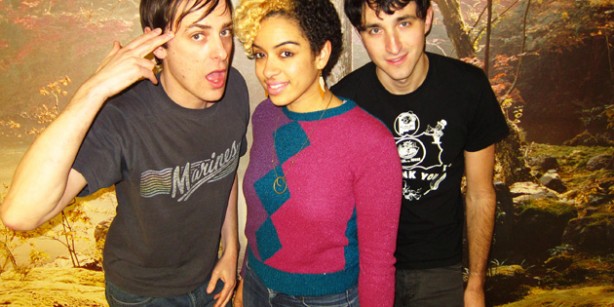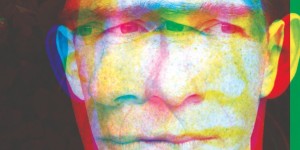 Music
Music
Q&A: The Thermals' Hutch Harris on killing, conspiracies, and post-'Portlandia' Portland
by Nicole Villeneuve
May 7, 2013
There are few bands for whom the potentially problematic not-broke-don’t-fix-it cliché could safely apply. Bad Religion’s decades of near-perfect pop-punk come to mind, as does the underrated pop genius of one-time hitmakers Nada Surf. With the release of their sixth album Desperate Ground, The Thermals further carve their place among the strong and sturdy. They’ve given us ten years of smart, serious four-chord pop-punk so far, and we never want them to stop.
Though 2009’s Now We Can See and 2010’s Personal Life covered more introspective matters, Desperate Ground veers back to the venomous energy of 2006’s fan favourite The Body, The Blood, The Machine, a thematic take on America’s righteous Christian landscape. This time, the Thermals have killing on the brain. We spoke with singer/guitarist Hutch Harris about war, conspiracy theories, and living in a post-Portlandia Portland.
AUX: What’s that pre-record release feeling like right now?
Hutch Harris: It’s exciting now. The closer it gets, the better, because it’s a long lead time. The record wasn’t mastered that long ago, but we finished recording in like November. For the band, it feels like forever between the time you finish the record and the time it comes out. So we’re just ready.
You’ve had a chance to play a bit from it. You were at SXSW this year, at least.
Yeah, we went to New York and New Jersey and did a couple shows; we went to Texas and played SXSW all week. We went to L.A. And we went to San Francisco for Noise Pop. So we’ve been playing a lot of the new songs. It’s cool to see what songs people get excited about the first time they hear them.
Have there been any standouts that have surprised you?
One of the songs, “You Will Find Me,” that one, instantly you can see people getting into it, getting really excited and rowdy when we start playing it. So that’s been really cool.
This album, as with most of yours, especially the last few, is pretty lyrically dense. Do you always hope that people digest that and react to that as much as the immediacy of the music?
I would hope that people really get into the lyrics. For me the lyrics are such a huge part of the band. The music is really simple, and the lyrics are simple too, but at the same time, there’s a lot going on in the lyrics. I would love for people to really get into them, and I feel like they do. On our past records, they definitely do. I don’t feel misunderstood. People really pay attention and get where we’re coming from.
Has that lyrical content always been that important? There’s been a definite shift after The Body, The Blood, The Machine.
Definitely. The first record, More Parts Per Million, I was just writing one song a day, from start to finish, and recording the song that day too. So there’s a real urgency, and I tried really hard not to overthink the lyrics. It was what was coming out quickly and automatically. For the second record [Fuckin A], it was different. I was piecing together all this short stuff I had written on the tour on the year in between those records. It was the same kind of idea. It wasn’t super premeditated. A lot of the lyrics are a kind of collage of different ideas that I had. There were a couple of years between that and The Body, The Blood, where I started writing really seriously. It was such a big jump in sound, too, for that record. Kathy [Foster, bass] and I really wanted to take the band to a new place, and really got serious about lyrics starting then.
And has that mindset or process evolved even since then?
I still always set aside time to write. And then I do a ton of re-writing. This record and Now We Can See are similar in the way that I wrote the lyrics in that, I would write an entire set of lyrics for one song, and then throw it all out. I’d maybe pull a couple phrases or words, then start fresh. You can write a whole song and think it’s great, then the next day you can see it could be way better. In re-writing, it’s where the really great lyrics come out.
What kind of mindset do you get yourself into to write these themed albums?
Making a record, we want something that ties all the songs together. We don’t want the records to just be a collection of songs that happen to be written all at the same time. We want there to be an arc, we want the songs to flow from one to the next, we want the record to make sense as a whole piece. For this one, I wanted to write about war and violence, and slowly, the ideas mutated. I didn’t want to write about specific wars, or anything going on right now. A lot of our records, I’m trying to write something that’s more timeless. I love 80s punk, but there are so many songs about like, Reagan and Margaret Thatcher. They’re so specific, and it’s hard to go back to those because they’re so dated. We’re making sure there aren’t a lot of proper nouns. We’re not singing specifically about real people or real events.
Some of the angles you take on this album are a bit scary…
Totally!
Like you almost take on these real cinematic adaptations of characters. Like the destiny part in “Born to Kill.” Too intense.
Definitely. Fate was one of the working titles I had for the record. This is the story about someone who, for better or worse, is killing. This is a record about killing. This is a record about human violence. About never-ending human violence. And yeah, a lot of it is about destiny and fate. It’s impossible for humans to avoid violence. To me, all of human history is just an incredibly violent story. We talk about the inevitability of war and of human violence. It seems to me that it’s something that never ends. And yeah, that is very scary.
Are you personally exploring questions here? Like, are humans inherently violent?
I do think so. To me the record’s not about trying to ask why or explain why. This record is not an anti-war record. It’s not an anti-violence record. It’s not pro at the same time. There are plenty of anti-war songs, so that’s not what we were going for. You talk about it being cinematic, and that’s exactly what we wanted. We wanted to make it like an action movie. It’s entertainment. We’re not trying to preach about the evils of humans, though that is one of the themes.
Do you ever consider peoples’ reactions? I assume an album like this could be more contentious than one of your more personal ones.
I think that’s more wishful thinking. If we do get hate mail, it means more people have heard and are affected by the record. We don’t necessarily want that, but we have to be free to say whatever we want. No matter how irresponsible or wreckless. At this point, I don’t expect that. This record was finished before the shooting in Newtown happened, and there have been so many shootings in this country last year. There always are. It’s a very American thing. We’re always killing each other. But Newtown obviously was a big event in this terrible year where it finally seemed to be like, “okay, enough.” And people were obviously really upset. But our record was already finished at that point, and there was one night where I felt worried. But at the same time, this is the record we made, and we’re going ahead with it. I don’t want to hurt anyone’s feelings with this record who have been victimized by violence. I would just say if anyone has a problem with or is offended by this record, they should just not listen to it.
Is being a conscious American exhausting, day to day?
I can’t speak as a victim of any of these events. From my perspective, it’s just embarrassing. What is wrong with us? Why? The history of our country, the way it is now, it’s a story of violence. It’s a brutal history that continues all the time. It’s just ridiculous how violent Americans are towards each other. And towards the rest of the world, continuously.
Not to make light of this, but speaking of Newtown, had you ever gotten into the great Youtube conspiracy videos?
(Laughs) That. Is. In. Credible. People are fucking crazy. There are some conspiracy theories I can totally get into, but that is probably the most ridiculous thing I ever heard. I feel like it’s a very tiny—I wouldn’t even call it a movement. There’s a very small group of uninformed, crazy people that get into that. I was flabbergasted.
I can’t help it though. I love a good conspiracy, on the internet especially.
There are some great ones. Kennedy assassination is great. 9/11 is a really good one. Ones with evidence and different conspiracies. But the Newtown one is so ridiculous. You need to look somewhere else. It’s too unbelievable.
Not to go too far in the other direction now, but I wanted to ask about the pre-Portlandia Portland line in your new press materials. What’s post-Portlandia Portland like?
(Laughs) Post-Portlandia, there’s been so much hype about Portland for so long. We love Portlandia, those are friends of ours. We went to New York and played the premiere and it was super awesome. So it’s not like anti-Portlandia, but it is like, this band’s been around for 10 years. Portland was quite different 10 years ago. I’m happy I moved here 15 years ago, it was incredibly different then. I write all that press stuff, and I always keep it kind of bitchy, or sassy, because it makes for good copy. We just want people to know we were here way before the hype. But somehow, at the same time, that line is riding the hype as well. Writing that press stuff is all about hyperbole and just giving people something to talk about. Or be annoyed by.

This article originally appeared in the May 2013 Issue of AUX Magazine.
Download and subscribe for free in the app store.
Tags: Music, Interviews, AUX Magazine, Portlandia, The Thermals





